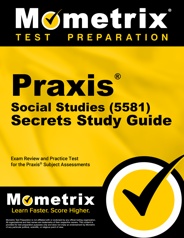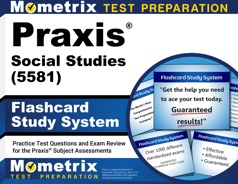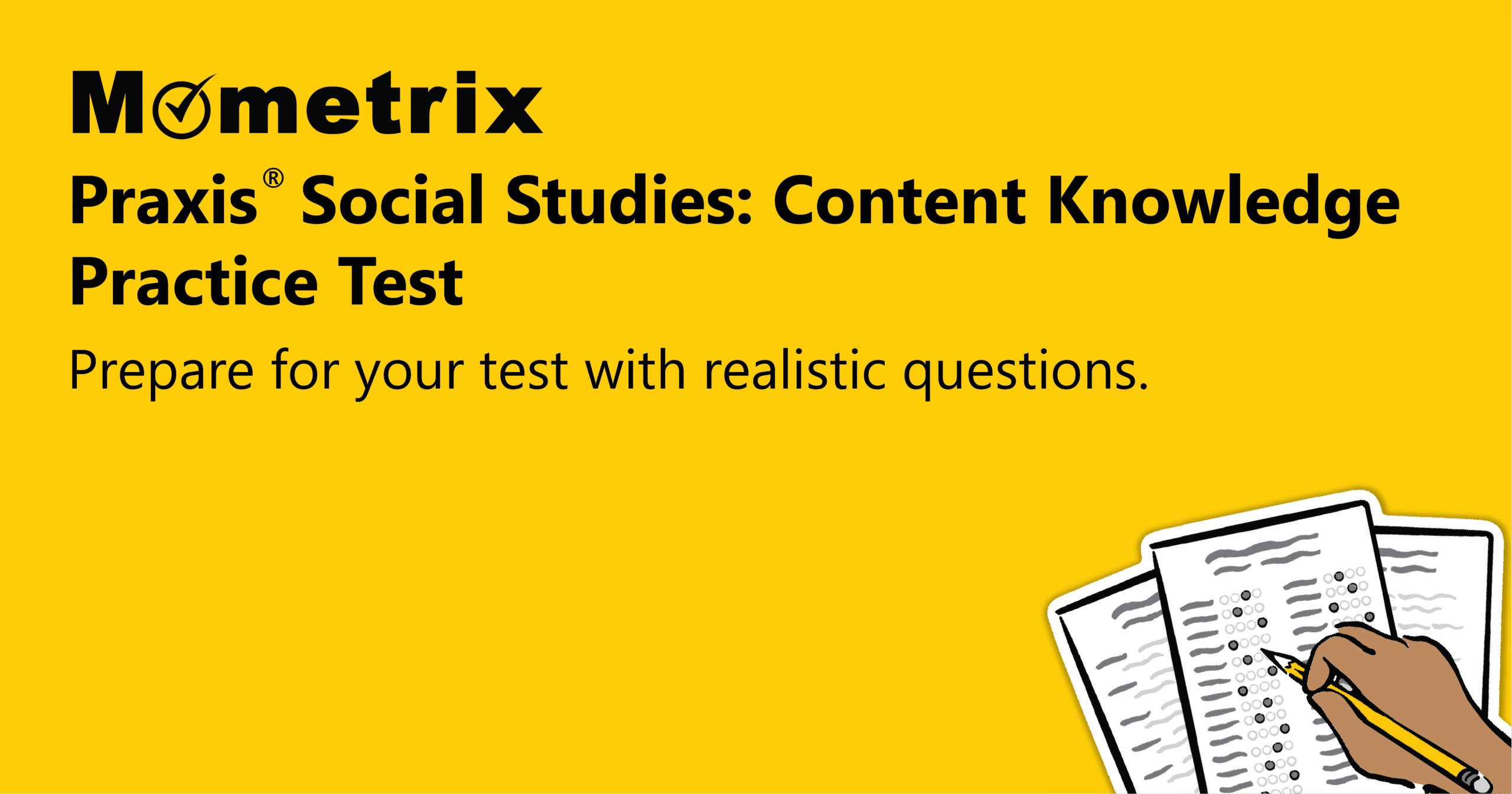The Praxis® Social Studies (5581) test is used to assess the knowledge, skills, and abilities of prospective entry-level social studies teachers for secondary school.
Click “Start Test” below to take a free Praxis Social Studies practice test!
Praxis (5581) Exam Outline
The Praxis Social Studies test contains 140 selected-response questions and has a time limit of 2.5 hours. The selected-response questions may appear in the form of any of the following:
- Single-selection multiple-choice
- Selecting ALL correct answers from a list of choices
- Clicking parts of a graphic such as a map or a chart
- Dragging and dropping answers into a targeted area on the screen
- Selecting the correct answer from a drop-down menu
The exam is split into five content categories:
I. United States History (40 questions)
The questions in this category cover a wide range of US history topics, from pre-colonization geography to contemporary US politics. Here are some of the specific topics covered in this category:
- Basic geography, people groups, and cultures before European colonization
- Origins of the American Revolution and its impact
- Causes and consequences of territorial expansion in the US
- Developments in politics, culture, and society from the Progressive Era through the New Deal
- US participation in both World Wars
- Origins, development, and consequences of the Cold War
- Ongoing impact of race, ethnicity, and gender throughout US history
- Influence of religion in US history
- Causes and consequences of immigration to the US and internal migration within the US
II. World History (31 questions)
The questions in this category cover a wide range of world history topics, from the formation and interactions of classical civilizations to the effects of major economic transformations on world societies. Here are some of the specific topics covered in this category:
- Formation, interactions, and organization of classical civilizations (Greece, Rome, India, China, and Persia) from 1000 BCE to 500 CE
- Developments in Europe from the Renaissance through the Enlightenment
- Causes and consequences of the World Wars and the Cold War
- How world societies have been shaped by technological advancements
- Major political ideologies that have influences on societies in the modern world
- Differences and similarities in family structure and gender roles across societies
- Major demographic trends in world history
- The role of trade within and between societies
III. Geography (19 questions)
The questions in this category cover a wide range of geography topics, from reading maps to the contemporary patterns of globalization. Here are some of the specific topics covered in this category:
- Various map types and projections
- Spatial patterns on local and global scales
- Characteristics and spatial distribution of ecosystems
- Renewable and nonrenewable natural resources
- Settlement and migration patterns
- Interrelationships of humans and their environments
- Contemporary patterns and impacts of industrialization, development, and globalization
- Demographic patterns and change
- Political geography concepts
IV. Civics (32 questions)
The questions in this category cover a wide range of topics, from political theory to international relations. Here are some of the specific topics covered in this category:
- Major political concepts
- Major political theorists
- Major political orientations
- US government and policies
- Civil liberties and civil rights
- Constitutional underpinnings
- Comparative politics
- International relations
- Forms of government
- Major electoral systems
- Major regime types
V. Economics (18 questions)
The questions in this category cover a wide range of macroeconomics and microeconomics topics. Here are some of the specific topics covered in this category:
- Factors of production
- Distribution of income
- Economic systems
- Opportunity costs
- Product markets
- Scarcity
- Supply and demand
- Unemployment
- Inflation
- Fiscal policies
- Exchange rates
- Economic growth
- Business cycle
Check Out Mometrix's Praxis Study Guide
Get practice questions, video tutorials, and detailed study lessons
Get Your Study Guide
Registration
To register for the exam, you will need to create an online ETS account. Once this account is created, you can apply to take the exam.
During the exam registration, you will be asked to select the test-taking format (remote or at a testing center), test location (if you are taking the test at a testing center), and test date. You will also need to pay the $130 exam fee.
Test Day
In-person Testing
On the day of your test, you should arrive at the testing facility 30 minutes before the scheduled appointment time. Once you arrive, you will be asked to present two forms of valid identification, one of which must be a photo ID. If either ID is invalid or you forget to bring one, you will not be able to take the test.
Personal items will not be allowed into the testing center, so you will be asked to leave things like your phone and any bags, notebooks, and food items at home or in your car.
Remote Testing
To take the exam remotely, you must use a laptop or desktop computer (touchscreens and tablets are not allowed) that has speaker, microphone, and camera (internal or external) capabilities. Before test day, you will need to download and install the ETS Secure Test Browser on your computer. This browser is what you are required to use to take the test.
Your environment must be private, with no traffic in and out of your testing area. The area where you take the exam must be clear of all personal items, and you will not be allowed to wear headphones. The proctor will ask you to move the camera around so that your testing area can be observed, and at the end of your exam, the proctor will watch as you erase any notes you made.
How the Exam is Scored
One numerical point is added to your raw score for every question you answer correctly. You are not penalized for incorrect or unanswered questions, so you should make a guess anytime you do not know the correct answer. Your raw score is converted to a scaled score, and you will receive an official score report about five weeks after you complete the exam.
The score you need in order to pass the test is different depending on the state you take it in. Generally, you must obtain a minimum scaled score of 153 to pass.
Retaking the Test
If you do not pass the test, you may retake it after a 28-day waiting period.
Check Out Mometrix's Praxis Flashcards
Get complex subjects broken down into easily understandable concepts
Get Your Flashcards
FAQs
Q
How many questions are on the Praxis Social Studies test?
A
There are 140 selected-response question on the test.
Q
How long is the Praxis Social Studies test?
A
The time limit for this test is 2.5 hours.
Q
What is the passing score for the Praxis Social Studies test?
A
Each state determines its own passing score, which can range from 141 to 154.
Q
How much does the Praxis Social Studies test cost?
A
The testing fee is $130.
Praxis is a registered trademark of Educational Testing Service, which is not affiliated with Mometrix Test Preparation and does not endorse this page.


